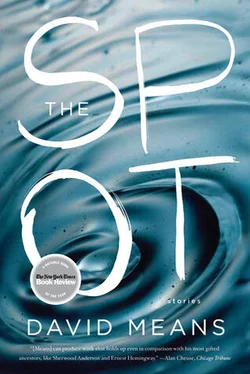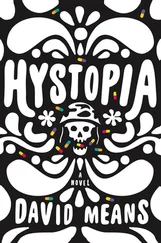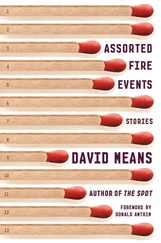Udall’s Natural Hair Ointment
McGee had steely gray hair combed neatly back and held to his scalp with a lacquer of Udall’s Natural Hair Ointment, vintage 1945, of which there were large quantities found in the cottage medicine cabinet and under the bathroom sink, sixty bottles in all, which led to one early theory that some of this tonic had saturated his skin and, in turn, his cell walls, and somehow, when he lit a cigarette (another key bit of evidence: a soft pack of Winstons, half gone, and a box of kitchen matches on the windowsill), sparked a violent combustion.
Before he fell into the bottle in a big way, McGee had been obsessive about his bodily care, although he had shunned modern products such as deodorant sticks for his own methods: that is, sprinkling his armpits with bay rum. In general, he was a man of outmoded customs: toothpicks for tooth cleaning; links to secure the cuffs; bandanas, and later fine linen handkerchiefs, folded neatly into the front pocket and occasionally taken out for a good, loud nose blow. McGee was a virtuosic nose blower, and his colleagues from his early days at the mill, those still alive, say he blew loud enough to be heard over the roar of the press drums and even the final rollers. One dubious theory has it that intense pressure in the nasal cavities can somehow induce spontaneous combustion.
The American Dream
Back when he was the head of Mear Paper, a firm that produced more wire-bound notebooks, check pads, carbon backing sheets, lined and unlined twenty-pound bond than any mill west of Maine, he used to say: It ain’t nothing to making goddamn paper. Find a few trees, chop ’em down, mash ’em up, add water. In just a few years he went from general mill hand to welder, to electrician, to manager, to owner and president.
Eventually, the large pond that settled to the west of the main plant and the plume of dioxins that leached into the aquifer were blamed for the cancer cluster that stretched in a tongue shape from Drake Street — old row housing originally built when the wax paper facility was erected in the early forties — to the end of Crane Avenue, where it ended abruptly at the location of McGee’s elegant Queen Anne — style home. His fall seemed mythic to those who saw him in his later years, dressed in his old mill overalls, stained black along the hip where his tool belt had worn a greasy spot, staggering outside of Hawks near the railroad station. Hawks, your bottom-end drunk bar and hobo hangout set as close to the double set of tracks — Chicago — Detroit, Detroit — Chicago — as it could get; Hawks, not much more than a tar paper shack with the obligatory single neon sign in the window, a pale pink outline of a cocktail glass sputtering epileptically.
The War in Vietnam
As one theory goes: McGee was fascinated by the protest immolation of monks in Vietnam, and had once been overheard saying he could understand the notions that get behind a man when he douses himself with gas to make a point. Inside his mill locker — kept as a gesture of solidarity with his employees — he had taped a magazine photo of Thich Quang Duc being consumed by flames. He studied it occasionally and marveled at the discipline of the monk in relation to the hungry disorder of the fire itself.
He talked sometimes of napalm: In retrospect it seems fit, to those who speculate on the cause of his S.H.C., to note that his son, Haze, was killed by the arrant use of this weapon/product in that war, a fact laying a bit of credence to the theory that McGee’s combustion was a sympathetic reaction, albeit delayed a few decades, to the news delivered by a soldier one May morning to the Queen Anne house on Crane Avenue. It is not inconceivable — to those who have endured the same kind of grief — that a man, on a hot summer night, reminiscing about his son, would draw up the deep pain of that loss much the way the wick (see “Wick Theory,” below) supposedly draws the melted fat, and in doing so might himself become overheated with the fires of melancholy and explode into sorrow-fueled flames.
Gloria
Some say McGee had a lover, a Chicago showgirl/call girl named Gloria who with his help came up on the New York Central and settled into the Delvic Hotel downtown. His old friend Marlin Duke recalls hearing him mumble something about his love flame, or having to attend to his love flame.
Perhaps in the white heat of memory, conjuring up the smooth skin of her forearms, the glossy smooth plain of flesh at the base of her spine, the husky elocutions of her smoky voice, or more specifically the way she had stood amid the long, slanting sun shafts in Union Station one fall afternoon, clutching her bag, reaching to adjust the pin that secured her pillbox hat, McGee had simply drawn too deeply from the well of memory that evening at the lake, sucked it all eagerly back, so that it stood in a stasis between his body and mind, in that delicate tissue, where it had congealed and fermented into a single spark bright and hot enough to ignite that final, albeit limited, inferno.
The Great Depression
Temperance workers attributed S.H.C. to drink and found a neat way to attach their moral/political agenda to the phenomenon by saying: That’s where the drunk burned, lost to the sins of corn whiskey, hard cider, boot brandy, bourbon, and ripple, until his body — mercy be to the Lord our host — absorbed too much of the distillate and burst forth in a fire of Judgment. Up and down the Dust Bowl countryside, at the bottoms of hopper cars, in the corners of empty reefers you’d find them, bleached white, skulls and feet, the relics of the Lord’s Judgment left to remind the living of the necessity for Temperance.
Wick Theory
In one controlled experiment a sedated pig was wound in cotton gauze — wrapped tight, swaddled like a newborn — and then set ablaze to prove the “wick effect.” The theory: The fire, fed by the bubbling fat as flames wicked through the cotton, would sustain itself in a concentrated form until the fat and bones were carbonized and the cotton itself burned away and only the head, falling from the flames, would be left with the proverbial pile of ash and some smoke stains on the laboratory ventilation bib. Throughout the experiment, the subject’s snout moved up and down, softly nodding.
Early Flame Experience
Through the smoked goggles the flame looked tight and made small, lip-smacking twists as it touched the metal and then blew out the spark bloom. At an early age, McGee proved himself a brilliant welder and could draw a clean, neat line that tapered out to a beadless end. His relationship with fires in general and flames in particular was a good one, his coworkers said; and after he went to electricians’ school in Detroit, he returned to the mill with a deep understanding of spark formation and an assured intuition that allowed him to tinker in high-voltage boxes without shutting the power. It was said he could grab one of the giant fuses barehanded and yank it without a flinch. How these facts connect with the overall mystery of his end remains unclear, although it is often said that beneath any mystery lies another, even deeper one, and some speculate that his abilities around electrical forces and, in turn, the fires they could or might create were connected to the fact that on that summer night, alone in his cottage, he found some neat and tidy final arrangement with the demise he had avoided so easily at a time when his life was moving with such vigor and ease into an ascendancy. So it seems natural to some that all of the avoided fires — the curse of any electrician — would finally come back to haunt him in one singular burst, and in so doing provide his decline with a terminal end.
Читать дальше












